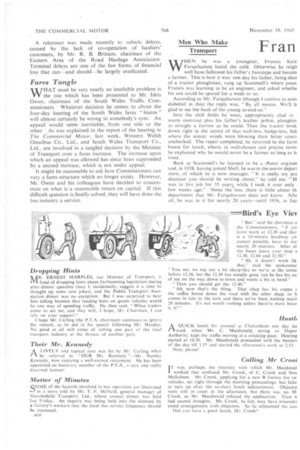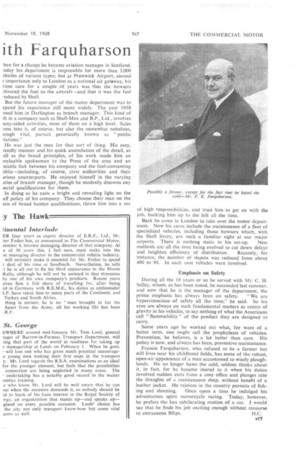Men Who Make
Page 50

Page 51

If you've noticed an error in this article please click here to report it so we can fix it.
Transport Fran
ith Farquharson
HEN he was a youngster, Francis Keit] Farquharson hated the cold. Otherwise he migh well have followed his father's footsteps and becom, a farmer. This is how it was: one day his father, being shot of a tractor ploughman, rang up Scammell's where youn: Francis was learning to be an engineer, and asked whethe his son could be spared for a week or so.
According to Mr. Farquharson (though I confess to som disbelief in this) the reply was, " By all means. We'll b glad to see the hack of the young so-and-so."
Into the chill fields he went, appropriately clad in warm overcoat plus his father's leather jerkin, ploughin, as straight a furrow as he could. Then the tractor brok down right in the centre of that wall-less, hedge-less, fieli where the winter winds were blowing their bitter cours unchecked. The repair completed, he returned to the farm house for lunch, where, in well-chosen and precise term! he explained why he would never be a farmer as long as hi lived.
Back at Scammell's he learned to be a Motor enginee and, in 1938, having joined Shell, he was in the motor depart ment, of which he is now manager. " It is really my pre decessor you should be writing about," he told me. "H was in this job for 35 years, while I took it over only ; few weeks ago." None the less, there is little about th, department that Mr. Farquharson does not know. Afte all, he was in it for nearly 20 years—until 1956, in fact 'hen for a change he became aviation manager in Scotland. 'oday his department is responsible for more than 3,000 ehicles of various types; but at Prestwick Airport, second t importance only to London as a national air gateway, his rime care for a couple of years was that the bowsers .livered the fuel to the aircraft—and that it was the fuel .oduced by Shell.
But the future manager of the motor department was to (nand his experience still more widely. The year 1958 tund him in Darlington as branch manager. This kind of 43 in a company such as Shell-Mex and B.P., Ltd., involves tany-sided activities, most of them on a high level. Sales )me into it, of course, but also the somewhat nebulous, lough vital, pursuit generically known as "public dations."
He was just the man for that sort of thing. His easy, iendly manner and his quick assimilation of the detail, as ell as the broad principles, of his work made him an [valuable spokesman to the 'Press of the area and an -niable link between his company and the fuel-consuming sblic—including, of course, civic authorities and their trious counterparts. He enjoyed himself in the varying sties of branch manager, though he modestly disowns any tecial qualifications for them.
In doing so he casts a bright and revealing light on the aff policy of his company. They choose their man on the Isis of broad human qualifications, throw him into a sea
of high responsibilities, and trust him to get on with the job, backing him up to the hilt all the time.
Back he came to London to take over the motor department. Now his cares include the maintenance of a fleet of specialized vehicles, including those bowsers which, with the Shell livery, are such a familiar sight at our major
airports. There is nothing static in his set-up. New methods are all the time being evolved to cut down delays
and heighten efficiency of distribution. Recently, for instance, the number of depots was reduced from about 400 to 90. In each case vehicles were involved.
Emphasis on Safety During all the 18 years or so he served with Mr. C. H. Selley, whom, as has been noted, he succeeded last summer, and now that he is the manager of the department, the prime emphasis has always been on safety. "We are hyperconscious of safety all the time," he said. SO his eyes are always on such fundamental matters as centre of gravity in his vehicles, to say nothing of what the Americans call " flammability " of the product they are designed to carry.
Some years ago he worked out what, for want of a better term, one might call the prophylaxis of vehicles. Prevention, he believes, is a lot better than cure. His policy is now, and always has been, preventive maintenance.
Francis Farquharson, who refused to be a farmer but still lives near his childhood fields, has some of the robust, open-air appearance of a man accustomed to windy ploughlands. He no longer hates the cold, seldom thinks about it, in fact, for he became inured to it when his duties involved sudden exits from a cosy office and plunges into the draughts of a maintenance shop, without benefit of a leather jacket. He rejoices in the country pursuits of fish
ing and shooting. Once upon a time he indulged his adventurous spirit motorcycle racing. Today, however, he prefers the less exhilarating motion of a car. I would say that he finds his job exciting enough without recourse to extraneous fillips. H.C.




































































































































